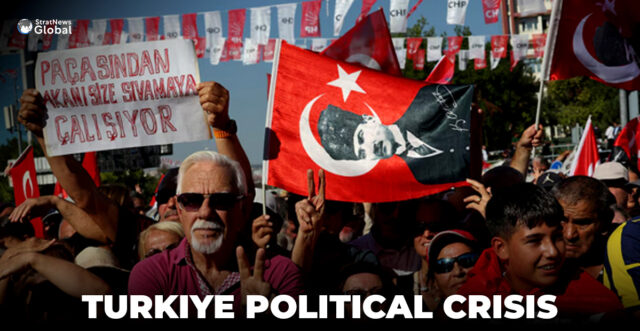A Turkish court on Monday postponed its decision on whether to oust the main opposition leader and nullify his party’s 2023 congress, a case tied to alleged irregularities that has already intensified the country’s political turmoil.
The judge in Ankara adjourned the case to October 24.
Hundreds of Republican People’s Party (CHP) members, including Erdogan’s main political rival, Istanbul Mayor Ekrem Imamoglu, have been jailed pending trial in a separate, sprawling legal probe into alleged graft and terrorism links.
If the court rules next month to annul the CHP’s congress, that would effectively strip Ozgur Ozel, the party chairman, of the title that he won there.
The case, seen as a test of Turkey’s shaky balance between democracy and autocracy, threatens to deepen disarray and infighting in the opposition camp, boosting President Tayyip Erdogan’s chances of extending his 22-year rule.
The centrist CHP, which denies the charges against it, is level with Erdogan’s Islamist-rooted, conservative AK Party (AKP) in polls. Ozel, 50, its combative, hoarse-voiced leader, has risen to prominence since Imamoglu’s detention.
Anti-Erdogan street protests have flared in recent days ahead of the court ruling, and the case has badly rattled Turkish assets and the lira currency. The lira strengthened a little after Monday’s adjournment decision.
The opposition, human rights groups and some European leaders say the crackdown on the CHP is politically motivated and anti-democratic, charges rejected by the government, which says that Turkey’s judiciary is independent.
Intensified Opposition Crackdown
Turkiye is witnessing a deepening political crisis after authorities intensified their crackdown on opposition leaders, arresting several high-profile figures under corruption charges.
The most significant development came with the detention of Istanbul’s mayor, Ekrem Imamoglu, a leading opposition voice and one of President Recep Tayyip Erdogan’s most prominent challengers.
Imamoglu’s arrest not only heightened political tensions but also triggered massive protests across the country, underscoring the growing discontent with the government’s tightening grip on dissent.
Thousands of demonstrators poured onto the streets of Istanbul, Ankara, and other major cities, waving flags and chanting slogans against what they described as politically motivated charges.
Police responded with water cannons, tear gas, and mass detentions, further inflaming public anger.
The scale of the protests highlighted Imamoglu’s symbolic importance as a figure who had defeated Erdogan’s party in local elections, breaking the ruling party’s decades-long dominance over Istanbul.
The government has defended the arrests, insisting that they are part of an anti-corruption drive.
However, critics argue that the move is a calculated attempt to weaken the opposition ahead of future elections. Human rights groups have also condemned the crackdown, warning that Turkiye’s democratic institutions are being systematically eroded under the guise of legal proceedings.
(With inputs from Reuters)





